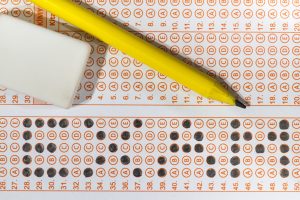 Anyone reading this article focused on the legal industry has likely either taken the LSAT or plans to. For generations of lawyers, the LSAT has been a shared hurdle, a shibboleth, a filtering mechanism, and our profession’s own personal sorting hat. But this universal lawyerly experience may not be universal for much longer.
Anyone reading this article focused on the legal industry has likely either taken the LSAT or plans to. For generations of lawyers, the LSAT has been a shared hurdle, a shibboleth, a filtering mechanism, and our profession’s own personal sorting hat. But this universal lawyerly experience may not be universal for much longer.
The ABA is currently winding up its comment period on proposed revision of its criteria for accreditation of law schools. The most potentially impactful change proposed is the outright elimination of the requirement that ABA-accredited schools include standardized testing as part of their admissions process.
It’s Already Less Universal Than You Might Think

Skills That Set Firms Apart
Legal expertise alone isn’t enough. Today’s most successful firms invest in developing the skills that drive collaboration, leadership, and business growth. Our on-demand, customizable training modules deliver practical, high-impact learning for attorneys and staff—when and where they need it.
It may surprise some in the readership to learn that it’s already technically possible to get into law school without taking the LSAT. Since at least 2017, a number of law schools within the United States permit applicants to take the GRE in lieu of the LSAT. COVID-19 prompted even more widespread adoption of the optional LSAT — to the point that even the oldest of the old guard law schools (like Yale) have begun allowing law students to apply with only a GRE.
Allowing students to take a GRE in lieu of the LSAT is seen by some as a way to broaden the pathways for talented students to make it into law school. Capable students with financial constraints might not have the funds to take both the general-purpose GRE and the single-purpose LSAT, or the time or resources to adequately study for both. By allowing promising students to apply with strong GRE scores and not forcing them to take the LSAT as well, law schools may find themselves able to consider quality candidates who previously would have had to give up their hopes of joining the legal profession strictly from a logistical standpoint.
The Whys And The Why Nots
If this new ABA accreditation standard goes into effect, however, law schools will no longer even need to require their applicants to take any standardized testing, whether the GRE, the LSAT, or something else. As one might expect, attitudes toward the proposal are diverse and passionate on both sides of the debate. Criticisms and defenses of the LSAT could merit their own column, or frankly their own book. At the risk of painting with a wildly overbroad brush, the major arguments for and against are outlined briefly below.

Inside The Minds Working At US Midsize Law Firms: 2025 Priorities Revealed
Midsize firms want smarter tech, not more. Our 2025 industry report shows how the right tools—and strategy—can drive growth, efficiency, and better client outcomes.
Proponents of the proposal see the elimination as a natural extension of efforts to free schools to govern their own admissions standards and consider students who might be successful lawyers but don’t thrive under standardized testing and other traditional criteria used to select who gets the opportunity to be an attorney. Arguments also exist that the LSAT, as with most standardized tests, continues to perpetuate unearned privilege. Wealthier students who can afford expensive test prep tend to outperform poorer students who are similarly academically situated. Getting rid of the standardized testing requirement would arguably eliminate some of that privilege perpetuation while also opening up law school admissions to students who would make capable attorneys but struggle with timed, high-pressure standardized tests.
The LSAT’s defenders might rebut or grant these arguments but still argue that the merits of the LSAT outweigh its arguable flaws. Even if it’s an imperfect test, the LSAT does appear to have some predictive value of students’ success in law school and in passing the bar. And the LSAT’s greatest strength is its objectivity and its ability to permit apples-to-apples comparisons among students with otherwise wildly divergent backgrounds, sometimes to the benefit of less financially fortunate students. A student from a small, inexpensive local college might struggle to get noticed in a stack of Tier 1 law school admissions applications, but a 175 LSAT score could help them get the attention they’d otherwise struggle to command. And nothing about the requirements that students take a standardized test like the LSAT prevents schools from still using other holistic, nontraditional criteria for assessing their candidates’ worthiness.
Admitting Admissions Needs Work
The problem with the current debate is that it’s all theoretical. Nobody really knows what the impact will be. The closest evidence we have is what we’ve seen in the 900-plus colleges that have gone “test optional” by no longer requiring the SAT or ACT. The phenomenon was accelerated during COVID-19 when students didn’t have access to testing. In that context, it’s largely too early to determine the results; the first classes that matriculated from the COVID-19 era test-optional tidal wave have yet to graduate.
Test optional is one thing for college, but it’s still another for law school where students will eventually be tested with a bar exam.
One way to thread the needle here would be to lift the requirement for a period — say five years — to see what impact the change would have over the long haul. Law schools would not have to participate in this experiment; there’s nothing in the proposal that says law schools can’t still choose to require LSAT scores for admission, just as many do now while others allow the GRE. At the same time, the testing window would give schools an opportunity to see if the mix of students entering law school changes and what happens to bar pass rates. Anything that trends in favor of allowing experimentation and opening up pathways to the law for qualified applicants seems like a net positive for our profession. The only thing we can say confidently is that we will never know unless we try.
Yet as much as part of me wants to have passionate feelings about this hot topic, another part of me can’t shake the feeling that it’s ultimately a tempest in a teapot. The LSAT is … well it’s kind of silly, really. I’ve never had a client reach out to me on a desperate deadline requesting advice on which bubbles to fill in on a Scantron sheet, or demanding to know whether Ted can be assumed to have eaten lunch if the person two seats to the left of Alice did not wear a brown scarf.
I’ve known any number of people who were wizards at testing into law school, geniuses at their end-of-semester exams, and middling-to-disastrous in the actual practice of the law. The LSAT does a pretty solid job of testing a certain strand of analytical rigor, but that ability to quickly and accurately analyze problems is a necessary, but not sufficient, criteria for success in this business. Dropping a 180 on a multiple-choice test says nothing about someone’s ability to land a client, close a deal, build relationships, or sway a jury.
Success in the practice of law takes smarts, but also drive, resilience in the face of adversity, empathy, and an unbeatable work ethic. Those intangible personality traits are much harder to test for, and harder still to identify in the brief time allotted to prospective students in a typical admissions process. But they are far and away the most important predictors of success both during school and out in the professional world. Anyone who can figure out a way to test for that on a Scantron sheet will be doing our profession, and our world, a favor. Until then, let’s push our profession to think outside the bubbles and find the best future colleagues we can.
 James Goodnow is the CEO and managing partner of NLJ 250 firm Fennemore. At age 36, he became the youngest known chief executive of a large law firm in the U.S. He earned his JD at Harvard Law School and attended Cambridge Business School (UK), where he wrote his master’s thesis on how to use entrepreneurial strategies to infuse innovation in law firms and established businesses. James is the co-author of Motivating Millennials, which hit number one on Amazon in the business management new release category. You can connect with James on LinkedIn, Twitter, or by emailing him at [email protected].
James Goodnow is the CEO and managing partner of NLJ 250 firm Fennemore. At age 36, he became the youngest known chief executive of a large law firm in the U.S. He earned his JD at Harvard Law School and attended Cambridge Business School (UK), where he wrote his master’s thesis on how to use entrepreneurial strategies to infuse innovation in law firms and established businesses. James is the co-author of Motivating Millennials, which hit number one on Amazon in the business management new release category. You can connect with James on LinkedIn, Twitter, or by emailing him at [email protected].